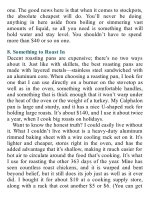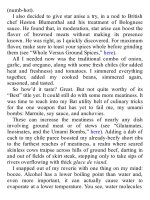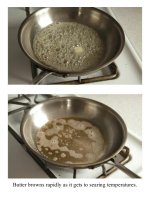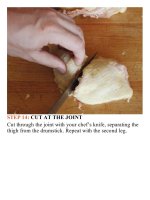The food lab better home cooking through science ( PDFDrive ) 21
Bạn đang xem bản rút gọn của tài liệu. Xem và tải ngay bản đầy đủ của tài liệu tại đây (178.04 KB, 2 trang )
{Thekeystogoodkitchen
science}
S
cience is not about big words. It’s not about lab coats
and safety goggles, and it’sdefinitely not about trying to
makeyourselfsoundfancy.Scienceisnotanendinandof
itself, but a path. It’s a method to help you discover the
underlying order of the world around you and to use those
discoveries to help you predict how things will behave in
the future. The scientific method is based on making
observations, keeping track of those observations, coming
up with hypotheses to explain those observations, and then
performing tests designed to disprove those hypotheses. If,
despiteyourhardest,mostsincereefforts,youcan’tmanage
to disprove the hypotheses, then you can say with a pretty
gooddealofcertaintythatyourhypothesesaretrue.Thatis
whatscienceis,anditcanbeassimpleasobservingthatof
thefirstthreebeersyouhad,thecoldestonewasthetastiest,
and therefore it’s probably a good idea to chill down the
fourth before you crack it open, or as complex as
determining the gene that decides whether your kid’s eyes
aregoingtobeblueorbrown.
Most of us practice science every single day, often
without even knowing it. For instance, when I first got
married, I noticed that there seemed to be a direct
correlation between some of my wife’s bad moods and my
propensity to leave the toilet seat up. (Observation.) I then
thoughttomyself,perhapsifIputthetoiletseatdownmore
often, my wife’s mood and therefore my own happiness
wouldimprove.(Hypothesis.)Itriedputtingdownthetoilet
seat a few times and waiting to see how my wife reacted.
(Testing.) Noticing an improvement in her moods, I started
putting the seat down almost every time, only occasionally
leavingituptotestthecontinuedvalidityofmyhypothesis.
Some folks would call this just being a good
roommate/husband.Icallitscience.
Believe it or not, the kitchen is perhaps the easiest place
for a regular person to practice science every day.You’ve
certainly performed your own scientific experiments in the
past. Here’s an example: You buy a new toaster with a
darknessknobthatgoesfromonetoeleven(justincaseyou
wantitoneshadedarkerthanten)andthennoticeyourtoast
iscomingouttoodarkonlevelsix,soyouturnitdownto
levelfour.Nowyourtoastistoolight.Workingfromthese
two observations, you hypothesize that perhaps five is the
rightlevelforyourbread.Loandbehold,yournextsliceof
toastandeverysliceoftoastafterthatcomeoutjustright.
Now, that may not be the most groundbreaking
observation in the history of science, and itis admittedly
very limited in its application (I mean, you can’t even
guarantee that the next toaster you own will have the same
scale),butit’ssciencenevertheless,andinthatsense,it’sno
differentfromwhatprofessionalscientistsdoeveryday.
Scientists know that bias can be a powerful force in









